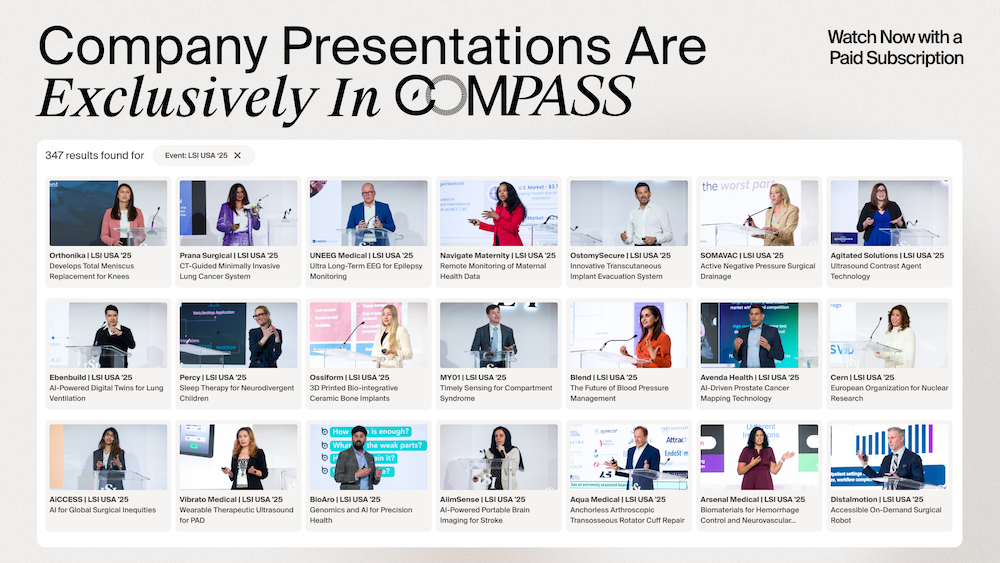- Video Library
- Lishan Aklog Presents Veris Health at LSI USA '23
Lishan Aklog Presents Veris Health at LSI USA '23
shaping the future of
Medtech at LSI USA ‘26
Waldorf Astoria, Monarch Beach

Lishan Aklog
Lishan Aklog, M.D. has been the Company’s Chairman and Chief Executive Officer since its inception. Dr. Aklog has also served as a member of the board of directors of HCFP, Inc., a financial advisory and investment firm, since its inception, and as a co-founding Partner of both Pavilion Holdings Group (“PHG”), a medical device holding company, since its inception in 2007 and Pavilion Medical Innovations (“PMI”), a venture-backed medical device incubator, since its inception in 2009. Dr. Aklog previously served as Chairman and Chief Technology Officer of Vortex Medical Inc., a PHG portfolio company, from its inception in 2008 until its acquisition in October 2012 by AngioDynamics Inc. (Nasdaq: ANGO) for $55 million.
Dr. Aklog has been a consultant to Biomet Inc., now Zimmer Biomet (NYSE: ZBH), since 2009. He previously served as a consultant to AngioDynamics, from 2012 to 2016, Edward Lifesciences Corp. (NYSE: EW), from 2007 to 2012, On-X Life Technologies Inc. from 2009 to 2012 and Atricure Inc. (Nasdaq: ATRC) from 2007 to 2016. Dr. Aklog also previously served on the Scientific Advisory Boards of numerous leading medical device companies, including Medtronic, St. Jude Medical, Guidant Cardiac Surgery (now, Maquet Cardiovascular) and Cardiovations (then, a division of Johnson & Johnson).
Dr. Aklog is an inventor on 13 issued patents and over 30 patent applications, including the core patents of Vortex Medical’s AngioVac system and the patents for a majority of the Company’s products. Prior to entering the medical device industry full-time in 2012, Dr. Aklog was, from 2006 to 2012, Associate Professor of Surgery, Chief of Cardiovascular Surgery and Chair of The Cardiovascular Center at St. Joseph’s Hospital and Medical Center’s Heart and Lung Institute in Phoenix, Arizona. From 2002 to 2006, Dr. Aklog was Assistant Professor of Cardiothoracic Surgery, Associate Chief of Cardiac Surgery and Director of Minimally Invasive Cardiac Surgery at Mount Sinai Medical Center in New York. From 1999 to 2002, Dr. Aklog was Assistant Professor of Surgery at Harvard Medical School, Director of the Cardiac Surgery Research Laboratory and an attending cardiac surgeon at Brigham and Women’s Hospital in Boston.
Dr. Aklog received his clinical training in general and cardiothoracic surgery at Brigham and Women’s Hospital and Boston Children’s Hospital, during which he spent two years as the Medtronic Research Fellow at Harvard Medical School’s Cardiac Surgery Research Laboratory. He was then awarded the American Association of Thoracic Surgery Traveling Fellowship pursuant to which he received advanced training in heart valve surgery under renowned cardiac surgeons Sir Magdi Yacoub at Harefield Hospital in London and Professor Alain Carpentier at L’Hopital Broussais in Paris. Dr. Aklog is a co-author on 38 peer-reviewed articles and 10 book chapters. He has served on the Editorial Board of the Journal of Cardiothoracic Surgery since 2006. He is a member of numerous professional societies and has been elected to the American Association of Thoracic Surgery. He served on the Board of Directors of the International Society for Minimally Invasive Cardiothoracic Surgery from 2006 to 2009 and as President of the 21st Century Cardiothoracic Surgery Society in 2011. Dr. Aklog was recognized as one of America’s Top Doctors in the Castle Connolly Guide from 2002 to 2013. He serves as Chairman of the Boston ECG Project Charitable Foundation and the New York Executive Committee of Human Rights Watch. Dr. Aklog received his A.B., magna cum laude , in Physics from Harvard University, where he was elected to Phi Beta Kappa. Dr. Aklog received his M.D., cum laude, from Harvard Medical School. The Company believes Dr. Aklog is well-qualified to serve on the Board due to his extensive experience in founding and building successful medical device companies, his distinguished career as an academic cardiac surgeon, his recognition as a thought leader and innovator both as a surgeon and a medical device entrepreneur and his widespread relationships in the healthcare and medical device communities.
Lishan Aklog
Lishan Aklog, M.D. has been the Company’s Chairman and Chief Executive Officer since its inception. Dr. Aklog has also served as a member of the board of directors of HCFP, Inc., a financial advisory and investment firm, since its inception, and as a co-founding Partner of both Pavilion Holdings Group (“PHG”), a medical device holding company, since its inception in 2007 and Pavilion Medical Innovations (“PMI”), a venture-backed medical device incubator, since its inception in 2009. Dr. Aklog previously served as Chairman and Chief Technology Officer of Vortex Medical Inc., a PHG portfolio company, from its inception in 2008 until its acquisition in October 2012 by AngioDynamics Inc. (Nasdaq: ANGO) for $55 million.
Dr. Aklog has been a consultant to Biomet Inc., now Zimmer Biomet (NYSE: ZBH), since 2009. He previously served as a consultant to AngioDynamics, from 2012 to 2016, Edward Lifesciences Corp. (NYSE: EW), from 2007 to 2012, On-X Life Technologies Inc. from 2009 to 2012 and Atricure Inc. (Nasdaq: ATRC) from 2007 to 2016. Dr. Aklog also previously served on the Scientific Advisory Boards of numerous leading medical device companies, including Medtronic, St. Jude Medical, Guidant Cardiac Surgery (now, Maquet Cardiovascular) and Cardiovations (then, a division of Johnson & Johnson).
Dr. Aklog is an inventor on 13 issued patents and over 30 patent applications, including the core patents of Vortex Medical’s AngioVac system and the patents for a majority of the Company’s products. Prior to entering the medical device industry full-time in 2012, Dr. Aklog was, from 2006 to 2012, Associate Professor of Surgery, Chief of Cardiovascular Surgery and Chair of The Cardiovascular Center at St. Joseph’s Hospital and Medical Center’s Heart and Lung Institute in Phoenix, Arizona. From 2002 to 2006, Dr. Aklog was Assistant Professor of Cardiothoracic Surgery, Associate Chief of Cardiac Surgery and Director of Minimally Invasive Cardiac Surgery at Mount Sinai Medical Center in New York. From 1999 to 2002, Dr. Aklog was Assistant Professor of Surgery at Harvard Medical School, Director of the Cardiac Surgery Research Laboratory and an attending cardiac surgeon at Brigham and Women’s Hospital in Boston.
Dr. Aklog received his clinical training in general and cardiothoracic surgery at Brigham and Women’s Hospital and Boston Children’s Hospital, during which he spent two years as the Medtronic Research Fellow at Harvard Medical School’s Cardiac Surgery Research Laboratory. He was then awarded the American Association of Thoracic Surgery Traveling Fellowship pursuant to which he received advanced training in heart valve surgery under renowned cardiac surgeons Sir Magdi Yacoub at Harefield Hospital in London and Professor Alain Carpentier at L’Hopital Broussais in Paris. Dr. Aklog is a co-author on 38 peer-reviewed articles and 10 book chapters. He has served on the Editorial Board of the Journal of Cardiothoracic Surgery since 2006. He is a member of numerous professional societies and has been elected to the American Association of Thoracic Surgery. He served on the Board of Directors of the International Society for Minimally Invasive Cardiothoracic Surgery from 2006 to 2009 and as President of the 21st Century Cardiothoracic Surgery Society in 2011. Dr. Aklog was recognized as one of America’s Top Doctors in the Castle Connolly Guide from 2002 to 2013. He serves as Chairman of the Boston ECG Project Charitable Foundation and the New York Executive Committee of Human Rights Watch. Dr. Aklog received his A.B., magna cum laude , in Physics from Harvard University, where he was elected to Phi Beta Kappa. Dr. Aklog received his M.D., cum laude, from Harvard Medical School. The Company believes Dr. Aklog is well-qualified to serve on the Board due to his extensive experience in founding and building successful medical device companies, his distinguished career as an academic cardiac surgeon, his recognition as a thought leader and innovator both as a surgeon and a medical device entrepreneur and his widespread relationships in the healthcare and medical device communities.

17011 Beach Blvd, Suite 500 Huntington Beach, CA 92647
714-847-3540© 2026 Life Science Intelligence, Inc., All Rights Reserved. | Privacy Policy







